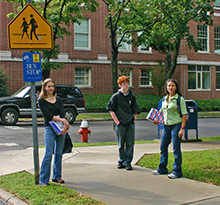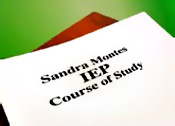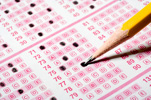What is the school counselor’s responsibility in the transition planning process?
Page 6: Post-Secondary Preparation: Education/ Training
 Measurable post-school goals for students with IEPs are developed to further their education or training. These measurable goals are coordinated with a student’s course of study and other education/ training (e.g., technical training institutes, community colleges, or other community training programs).
Measurable post-school goals for students with IEPs are developed to further their education or training. These measurable goals are coordinated with a student’s course of study and other education/ training (e.g., technical training institutes, community colleges, or other community training programs).
Scheduling Courses of Study
The IEPs of transition-age students include a course of study, which contains all the courses and other educational/ training experiences a student will need to prepare him or her for post-school options. The course of study should be tied to the student’s measurable post-secondary goals. It should also be flexible, reflect the changing needs of the student, and:

- Individualize the high-school curriculum
- Specify all available electives
- Specify the courses and additional experiences planned for each subsequent grade through graduation
- Depict the grade-by-grade progression in an organized fashion
One aim of the high-school course of study is to ensure that the student has the necessary foundation to be successful. In those instances when the student wishes to pursue a college degree, the course of study can be used to augment the basic graduation requirements in order to give students a competitive edge in the college admission process.
Steps in the Higher Education Admissions Process
Higher education settings include trade and technical schools, community colleges, four-year colleges, and universities. Click on each of the links below to learn more about the steps to prepare a student to pursue a degree at an institution of higher education.
 School counselors can steer a student to the most productive sources of information. Career goals should guide the research into education or training programs. For instance, many states’ Labor Departments, as well as the federal Department of Labor, offer online search options that direct the user to information about key occupational areas based on interest inventory results. This information typically lists the colleges or other organizations that offer training, licensure, or degree programs in the area of interest. Additional research on potential programs can be conducted at high school and public libraries, which offer catalogs from area colleges and other post-secondary schools. IEP team members can help the student think through the best options.
School counselors can steer a student to the most productive sources of information. Career goals should guide the research into education or training programs. For instance, many states’ Labor Departments, as well as the federal Department of Labor, offer online search options that direct the user to information about key occupational areas based on interest inventory results. This information typically lists the colleges or other organizations that offer training, licensure, or degree programs in the area of interest. Additional research on potential programs can be conducted at high school and public libraries, which offer catalogs from area colleges and other post-secondary schools. IEP team members can help the student think through the best options.
A number of guides exist for students with disabilities that offer some direction regarding the availability of disability services at various education and training programs across the United States. While these guides are helpful starting points, changes occur frequently. Therefore, the student in transition should ask many questions of any college to get the most up-to-date information.
![]()
 College catalogs will describe application requirements, which often include a nationally available examination such as the ACT or SAT. Students with documented disabilities are eligible for certain accommodations, depending on their eligibility category and the accommodations they are currently receiving. School counselors should be aware that accommodations must be arranged with the testing company many months in advance. Students may benefit from taking tests such as the PSAT when offered to gain additional practice with the test-taking conditions.
College catalogs will describe application requirements, which often include a nationally available examination such as the ACT or SAT. Students with documented disabilities are eligible for certain accommodations, depending on their eligibility category and the accommodations they are currently receiving. School counselors should be aware that accommodations must be arranged with the testing company many months in advance. Students may benefit from taking tests such as the PSAT when offered to gain additional practice with the test-taking conditions.
The websites for the ACT and SAT can be found on Page 13: References and Additional Resources.
 School counselors can help students and their families obtain information regarding the application process, admissions requirements, and financial aid opportunities and procedures. Much of this information is at a school counselor’s fingertips, thus saving a great deal of time for college-bound students. Some high schools arrange for annual college fairs, which allow students to meet with college recruiters firsthand. School counselors are often involved in the planning of these fairs. Finally, school counselors may be able to help youth with disabilities to think about particular issues regarding financial aid and enrollment. For example: Certain state financial aid funding options consider a student with a disability to be a family of one and thus able to meet income eligibility criteria. In addition, some states and colleges do not require undergraduate students with disabilities to enroll in a minimum of 12 hours to qualify for financial aid.
School counselors can help students and their families obtain information regarding the application process, admissions requirements, and financial aid opportunities and procedures. Much of this information is at a school counselor’s fingertips, thus saving a great deal of time for college-bound students. Some high schools arrange for annual college fairs, which allow students to meet with college recruiters firsthand. School counselors are often involved in the planning of these fairs. Finally, school counselors may be able to help youth with disabilities to think about particular issues regarding financial aid and enrollment. For example: Certain state financial aid funding options consider a student with a disability to be a family of one and thus able to meet income eligibility criteria. In addition, some states and colleges do not require undergraduate students with disabilities to enroll in a minimum of 12 hours to qualify for financial aid.
 Students with disabilities may need some guidance or assistance to complete their applications appropriately, particularly if the procedures or language are unfamiliar. School counselors could be helpful by reviewing the youth’s application prior to submission and by suggesting minimum and maximum numbers of college applications that juniors and seniors typically submit, with rationales for those numbers.
Students with disabilities may need some guidance or assistance to complete their applications appropriately, particularly if the procedures or language are unfamiliar. School counselors could be helpful by reviewing the youth’s application prior to submission and by suggesting minimum and maximum numbers of college applications that juniors and seniors typically submit, with rationales for those numbers.
 A representative from the support services program of any nearby colleges or universities to which the student has applied can be invited to the IEP meeting sometime during the senior year (or end of the junior year). While few disability services staff can attend IEP meetings, this invitation initiates communication and provides the opportunity to forward required diagnostic evaluation reports to the appropriate department. More distant service representatives can request those documents from the school, with the student’s or a parent’s permission (depending on age). Once those documents have been requested, the student should make an appointment on campus to meet with the service office representative to outline the necessary accommodations and how they will occur. School counselors or other IEP team members can prepare the student prior to the meeting by discussing his or her current accommodations and supports and determining which ones to request in higher education. At the college campus, the disability services representative will reach consensus with the student regarding the services and accommodations to be used.
A representative from the support services program of any nearby colleges or universities to which the student has applied can be invited to the IEP meeting sometime during the senior year (or end of the junior year). While few disability services staff can attend IEP meetings, this invitation initiates communication and provides the opportunity to forward required diagnostic evaluation reports to the appropriate department. More distant service representatives can request those documents from the school, with the student’s or a parent’s permission (depending on age). Once those documents have been requested, the student should make an appointment on campus to meet with the service office representative to outline the necessary accommodations and how they will occur. School counselors or other IEP team members can prepare the student prior to the meeting by discussing his or her current accommodations and supports and determining which ones to request in higher education. At the college campus, the disability services representative will reach consensus with the student regarding the services and accommodations to be used.
 Some post-secondary schools have their own entrance examinations. These exams may be used more as a placement tool for particular course levels rather than for admission purposes. They are typically administered during the student’s senior year so that admission and course planning can occur. School counselors should be familiar with the exams in their region or state so that they can advise youth and families on issues to consider.
Some post-secondary schools have their own entrance examinations. These exams may be used more as a placement tool for particular course levels rather than for admission purposes. They are typically administered during the student’s senior year so that admission and course planning can occur. School counselors should be familiar with the exams in their region or state so that they can advise youth and families on issues to consider.
 In addition to carrying out the six steps above that are required for college admission, students should make explicit efforts to practice skills that will promote their autonomy and independence. Preparation for the upcoming year, which will hold many new and different experiences, is essential to long-term success. Scheduling, organization, and some independent living skills (e.g., doing one’s own laundry, maintaining a healthy diet, setting aside study time) contribute to a student’s ability to cope when living away from home. Another way for students to become more independent is to organize all their financial, medical, and educational information (in print or digital formats) for easy access.
In addition to carrying out the six steps above that are required for college admission, students should make explicit efforts to practice skills that will promote their autonomy and independence. Preparation for the upcoming year, which will hold many new and different experiences, is essential to long-term success. Scheduling, organization, and some independent living skills (e.g., doing one’s own laundry, maintaining a healthy diet, setting aside study time) contribute to a student’s ability to cope when living away from home. Another way for students to become more independent is to organize all their financial, medical, and educational information (in print or digital formats) for easy access.
Accessing Informal Training
A range of more informal training options may be available, some only in metropolitan areas and others available anywhere:
- On-the-job training
- Apprenticeship programs
- Adult education, continuing education, or community education classes
- Home study courses
Transition Update – Sandra's Course of Study
 Although Sandra does not want to attend a 2- or 4-year post-secondary institution, Mr. Hunter works with her to develop a course of study that will support her current career goal: to become a certified nursing assistant. Mr. Hunter is careful to help Sandra select courses that are directly tied to her post-secondary goals.
Although Sandra does not want to attend a 2- or 4-year post-secondary institution, Mr. Hunter works with her to develop a course of study that will support her current career goal: to become a certified nursing assistant. Mr. Hunter is careful to help Sandra select courses that are directly tied to her post-secondary goals.
Courses listed in black address core curriculum credits required for high school graduation.
Courses listed in red indicate the electives that Sandra and Mr. Hunter have selected. Other course offerings may be substituted.
TRANSITION SERVICES
Course of Study for Sandra
| Year | Courses Selected for High School Program |
| Yr. 1/ 9th grade |
Skills for Personal Success (reading, future planning, personal management)
English I |
| Yr. 2/ 10th grade |
English II Applied Math I P.E./ Girls Basketball Keyboarding/ Computer Literacy Biology Concepts/ Biology World Geography |
| Yr. 3/ 11th grade |
Speech Geometry World of Work Experience I Psychology/ Sociology Health 1A/ Health 1B English III |
| Yr. 4/ 12th grade |
Creative Writing/ Journalism Child Development World of Work Experience II Yearbook/ Girls Basketball Communication Zoology/ Human Development |
- Explain whether you think Sandra’s proposed course of study addresses her future post-school needs.
- Does this course of study address her future recreational and leisure interests? What about her community participation goal? If not, what courses would you recommend substituting?